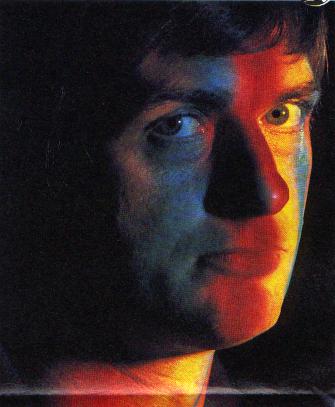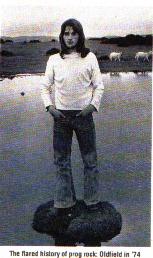SAVED
BY THE BELLS
Once
people wore kaftans and listened to concept albums. With Tubular Bells
II Mike Oldfield hopes they will do it again.
by Marianne
Jonssen
Vox
October 1992
 Old
hippies never die, they're simply reincarnated. Steve Hillage is recording
with The Orb and Shamen, ELP are recording and touring again, and Yes
made a packet on their world tour last year. Thanks to Bill Drummond
(KLF) and Dr Alex Patterson (The Orb), the post-rave generation -who
believe in "getting out of it" to a soundtrack of weird and
wonderful laid-back sounds in the "chill-out room" - have
discovered the early -'70s progressive rock genre. Twenty years after
the release of Mike Oldfield's Tubular Bells laid the foundations for
Richard Branson's Virgin empire, the master knob-twiddler is set to
release Tubular Bells II.
Old
hippies never die, they're simply reincarnated. Steve Hillage is recording
with The Orb and Shamen, ELP are recording and touring again, and Yes
made a packet on their world tour last year. Thanks to Bill Drummond
(KLF) and Dr Alex Patterson (The Orb), the post-rave generation -who
believe in "getting out of it" to a soundtrack of weird and
wonderful laid-back sounds in the "chill-out room" - have
discovered the early -'70s progressive rock genre. Twenty years after
the release of Mike Oldfield's Tubular Bells laid the foundations for
Richard Branson's Virgin empire, the master knob-twiddler is set to
release Tubular Bells II.
Tubular Bells (the original) is now bracketed, by Oldfield at least,
with events such as man landing on the moon. "People remember what
they were doing when they first heard it," he claims. Certainly
there are more myths about Bells than there are about Neil Armstrong
- that it took an unbelievable 200 recording overdubs, that Oldfield
trooped the masters around scores of companies who
wouldn't even listen. The opening bars contain one of the world's most
profitable riffs ever, and it was written on one string. The piece has
a bizarre place in the flared history of progressive rock, and its repetitive
pattern, weird instruments, and spoken introductions made it unforgettable
at the time. Even Blue Peter mentioned it.
"Tubular Bells II is what Branson and everybody would have liked
me to have done in 1974, after the first one," says Mike Oldfield
of his newly-released re-working of this instrumental album debut. In
all the years Oldfield was with Virgin, Branson failed to get the Bells
sequel he wanted. As Virgin gets set to release the first TB on CD,
its author seems to be sticking two fingers up at his former home by
releasing TBII on WEA.
"Not
really," offers the affable old hippy, relaxing in a studio in
the south of France. "I still talk to Richard; he gave me cheap
flights on his airline." A hint of a smile here. "I was invited
to go and stay on his island free of charge. And he rang me up the day
he sold Virgin and thanked me for making it possible. He didn't offer
me half the proceeds or anything (definite laughter now) but at least
he was gentlemanly enough to say thanks."
In
Tubular Bells II, produced by Trevor Horn, WEA have a work from Oldfield
that hints strongly at the melody, timbre and structure of the original,
an album bought by some 16 million record buyers around the globe.
But it's not, Oldfield scolds, a remake - "I wouldn't bother."
Despite Virgin having pressed up an orchestral version of TB in 1975,
Oldfield refused to deliver TBII to Branson back in 1974 when the bearded
impresario so clearly wanted it, because he claims: "I felt that
I'd explored that area of music and I wanted at the time to explore
different areas." He describes the follow-up albums, Hergest Ridge
(1974) and Ommadawn (1975), as "more folky things, Celtic music."
Although he made another ten albums or so before departing Virgin, the
failure of said LPs to register in the memories of any but Oldfield
family members meant that the times were a-changing, and Mike wasn't.
Will 1992 be the year the world turned again for Mike Oldfield?
"These
days I'm fed up with hearing Tubular Bells ripped-off all the time,"
complains the aggrieved writer. What he describes as "the front
part of Tubular Bells, a sort of hammering between one note and lots
of different other notes with a tinkly bell sound" has been sampled
and emulated and otherwise nicked by any number of musical thieves.
Pressed
for examples, he names Paul Hardcastle ("19") and an advertising
agency (a TV commercial for toothpaste). "Some things were so close
that my publishers actually managed to get a slice of the publishing
royalties on them," he reveals. "You hear them everywhere.
It was about time I did something similar to my original work."
As the '90s are set to become the sharing, caring decade, Mike is introducing
a new charitable organisation, Tonic.
At 20 he was unprepared for the vast fame afforded by Tubular Bells,
he explains. As a result I became very isolated and was unable to relate
to people in a normal way. A musical recluse, if you like. But as a
result of various therapy and seminars that I've done, I've learned
all the reasons why I behave like I do."
 Mike
discovered that all the nastiness in the world stems from those who
suffer wretched childhoods. "A lot of people turn to drugs or violence
or crime to escape unhappy family lives, to create something which they
can control. In my case I turned to music; many good musicians probably
had a similar experience. So I've started Tonic to sponsor people to
do therapy, to pass on that gift that I've been able to achieve."
Mike
discovered that all the nastiness in the world stems from those who
suffer wretched childhoods. "A lot of people turn to drugs or violence
or crime to escape unhappy family lives, to create something which they
can control. In my case I turned to music; many good musicians probably
had a similar experience. So I've started Tonic to sponsor people to
do therapy, to pass on that gift that I've been able to achieve."
As
any E-head will tell you, the drug and the music puts you in a different
world; but as the chemicals take their toll, so the post-rave generation
are turning to new, less taxing ways of reaching a state of other-worldliness.
Mike has his own passage to Nirvana.
"When
I'm really hot, making a piece of music, I go into some amazing trance.
I'm in a different place. It's like levitation, some sort of going-to-another-place,
astral projection, whatever you want to call it. But it's a truly wonderful
experience, the best I know of in the world: to be really soaring away,
making a piece of music." Spread your wings and, erm, fly...

